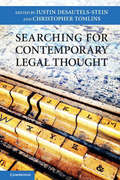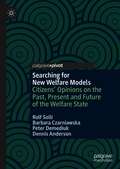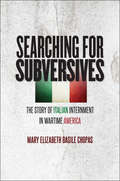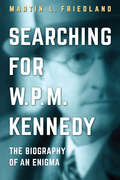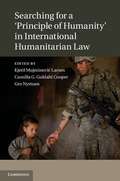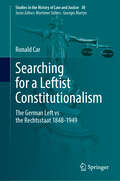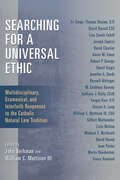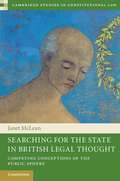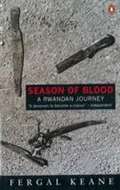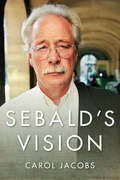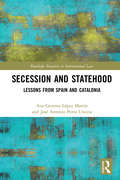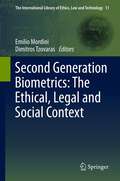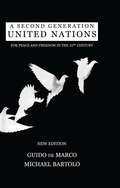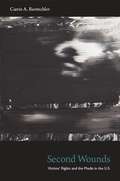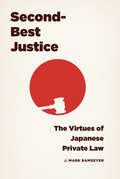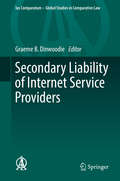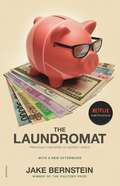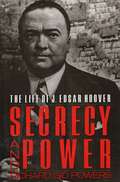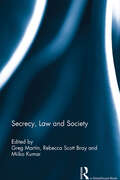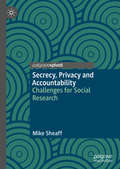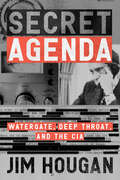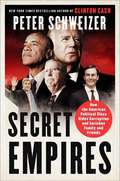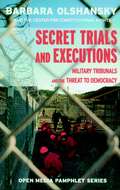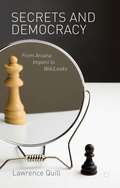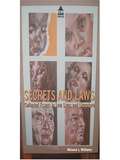- Table View
- List View
Searching for Contemporary Legal Thought
by Christopher Tomlins Justin Desautels-SteinFor more than a century, law schools have trained students to 'think like a lawyer'. In these times of legal crisis, both in legal education and in global society, what does that mean for the rest of us? In this book, thirty leading international scholars - including Louis Assier-Andrieu, Marianne Constable, Yves Dezalay, Denise Ferreira da Silva, Bryant Garth, Peter Goodrich, Duncan Kennedy, Martti Koskenniemi, Shaun McVeigh, Samuel Moyn, Annelise Riles, Charles Sabel and William Simon - examine what is distinctive about legal thought. They probe the relation between law and time, law and culture, and legal thought and legal action; the nature of current legal thought; the geography of legal thought; and the conditions for recognition of a new 'contemporary' style of law. This work will help theorists, social scientists, historians and students understand the intellectual context of legal problems, legal doctrine, and jurisprudential trends in the current conjuncture.
Searching for New Welfare Models: Citizens' Opinions on the Past, Present and Future of the Welfare State
by Dennis Anderson Barbara Czarniawska Rolf Solli Peter DemediukThis book explores the ways in which different generations think about how the welfare state is organised at present, and how it will be organised in future. Using the results of a study from Canada, Australia and Sweden, the book’s findings complement more traditional studies of the welfare sector, capturing the anxieties of citizens about the present and future of their countries’ welfare models, and presenting their thoughts on how the system can be re-organised in future. Positioning their three-country study within the history of the welfare state around the world, the authors seek to re-assess the role of the welfare state in governments around the world. Their findings will be of interest to those studying welfare policy as well as innovations such as basic income, e-health and policy responses to automisation.
Searching for Subversives: The Story of Italian Internment in Wartime America
by Mary Elizabeth ChopasWhen the United States entered World War II, Italian nationals living in this country were declared enemy aliens and faced with legal restrictions. Several thousand aliens and a few U.S. citizens were arrested and underwent flawed hearings, and hundreds were interned. Shedding new light on an injustice often overshadowed by the mass confinement of Japanese Americans, Mary Elizabeth Basile Chopas traces how government and military leaders constructed wartime policies affecting Italian residents. Based on new archival research into the alien enemy hearings, this in-depth legal analysis illuminates a process not widely understood. From presumptive guilt in the arrest and internment based on membership in social and political organizations, to hurdles in attaining American citizenship, Chopas uncovers many layers of repression not heretofore revealed in scholarship about the World War II home front.In telling the stories of former internees and persons excluded from military zones as they attempted to resume their lives after the war, Chopas demonstrates the lasting social and cultural effects of government policies on the Italian American community, and addresses the modern problem of identifying threats in a largely loyal and peaceful population.
Searching for W.P.M. Kennedy: The Biography of an Enigma
by Martin L. FriedlandBorn in Ireland in 1879, W.P.M. Kennedy was a distinguished Canadian academic and the leading Canadian constitutional law scholar for much of the twentieth century. Despite his trailblazing career and intriguing personal life, Kennedy’s story is largely a mystery. Weaving together a number of key events, Martin L. Friedland’s lively biography discusses Kennedy’s contributions as a legal and interdisciplinary scholar, his work at the University of Toronto where he founded the Faculty of Law, as well as his personal life, detailing stories about his family and important friends, such as Prime Minister Mackenzie King. Kennedy earned a reputation in some circles for being something of a scoundrel, and Friedland does not shy away from addressing Kennedy’s exaggerated involvement in drafting the Irish constitution, his relationships with female students, and his quest for recognition. Throughout the biography, Friedland interjects with his own personal narratives surrounding his interactions with the Kennedy family, and how he came to acquire the private letters noted in the book. The result is a readable, accessible biography of an important figure in the history of Canadian intellectual life.
Searching for a 'Principle of Humanity' in International Humanitarian Law
by Kjetil Mujezinović Larsen Camilla Guldahl Cooper Gro NystuenThe legal norms of International Humanitarian Law are the product of a compromise between humanitarian considerations and the demands of military necessity. In Searching for a 'Principle of Humanity' in International Humanitarian Law, international legal scholars consider whether humanitarian considerations have an independent legal impact on IHL beyond the formation of these norms. They ask whether a 'principle of humanity' can be said to have legal force in its own right. Moreover, the book investigates whether regional or national differences are emerging regarding the import and emphasis placed on humanitarian considerations. For instance, do states which are not directly affected by armed conflict attach a greater weight to humanitarian considerations when interpreting and applying IHL than those states which are more directly involved in armed conflicts? Specifically, this book examines whether a particular 'Nordic perspective' can be identified, owing to those states' involvement in armed conflicts outside their own territories in the post- Second World War era.
Searching for a Leftist Constitutionalism: The German Left vs the Rechtsstaat 1848-1949 (Studies in the History of Law and Justice #30)
by Ronald CarIs there a viable leftist constitutionalism that we can juxtapose with liberal constitutionalism, or is there really no alternative? If the left is considered an a priori enemy of the principle of the rule of law, the equal chance condition proves illusory. Accordingly, those asking for changes to social institutions will deem constitutionalism undemocratic. Hence, in our times of silent de-constitutionalization at the global level and rising populism and democratic backsliding at the national level, this book offers a valuable opportunity to reconsider one of the founding principles of liberal constitutionalism, the Rechtsstaat. It re-examines the controversies that accompanied the affirmation of the concept in a long-term perspective, from 1848 to the post-World War II constitutional debates. Since 1848 the German left has challenged the dominant liberal view of legitimacy, mainly by adopting Marx’s critique of the ideology of law and the state. Thus, the left has had to challenge not only the established order, but also the mainstream political and legal culture generated by the liberal discourse on rights. In search of constitutional viability, the left has oscillated between two tendencies. On the one hand, it has denounced the discourse on rights as an ideological smokescreen used by the ruling class to keep us from paying more attention to the actual level of democracy within the parties, the governmental bodies and in everyday social relations. On the other hand, the left has attempted to adjust its platform to the mainstream idea of constitutional legitimacy by devising its own sozialer Rechtsstaat. However, the break-even point has proven hard to find. If the acceptance of liberal principles was seen as less than wholehearted, leftist constitutional proposals aroused suspicions of a coverup for an unconstitutional rule (Unrechtsstaat). On the other hand, when the left has accepted liberal constitutional principles in full, its potential to challenge the social status quo has ultimately proven to be disappointing. The controversy culminated in a desperate and largely unknown attempt to devise a constitutional compromise between Liberalism and Socialism in East Berlin in the wake of the Cold War. Although doomed to fail and devoid of democratic credibility, the debates of the East German constitutional commission in 1948 offer important insights into a century of experiences, trials and errors in constitution-making seen from the leftist perspective.
Searching for a Universal Ethic: Multidisciplinary, Ecumenical, and Interfaith Responses to the Catholic Natural Law Tradition
by John Berkman William C. Mattison IIIThe best contemporary English-language resource on pursuing a universal ethics In this volume twenty-three major scholars comment on and critically evaluate In Search of a Universal Ethic, the 2009 document written by the International Theological Commission (ITC) of the Catholic Church. That historic document represents an official Church contribution both to a more adequate understanding of a universal ethic and to Catholicism’s own tradition of reflection on natural law. The essays in this book reflect the ITC document’s complementary emphases of dialogue across traditions (universal ethic) and reflection on broadly applicable ethical guidance within the Christian tradition (natural law). Among other things, the document situates the natural law ethical tradition within the larger search for a universal ethic. Along with its insightful essays, Searching for a Universal Ethic offers — for the first time in published form — the Vatican’s official English translation of In Search of a Universal Ethic.Contributors:John BerkmanSerge-Thomas Bonino, O.P.David Burrell, C.S.C.Lisa Sowle CahillJoseph E. CapizziDavid CloutierAnver M. EmonRobert P. GeorgeSherif GirgisJennifer A. HerdtRussell HittingerM. Cathleen KavenyAnthony J. Kelly, C.Ss.R.Fergus Kerr, O.P.Steven A. LongWilliam C. Mattison IIIGilbert MeilaenderLivio MelinaMichael S. NorthcottDavid NovakJean PorterMartin RhonheimerTracey Rowland
Searching for the State in British Legal Thought: Competing Conceptions of the Public Sphere
by Janet McleanJanet McLean explores how the common law has personified the state and how those personifications affect and reflect the state's relationship to bureaucracy, sovereignty and civil society, the development of public law norms, the expansion and contraction of the public sphere with nationalization and privatization, state responsibility and human rights. Treating legal thought as a variety of political thought, she discusses writers such as Austin, Maitland, Dicey, Laski, Robson, Hart, Griffith, Mitchell and Hayek in the context of both legal doctrine and broader intellectual movements.
Season of Blood: A Rwandan Journey
by Fergal KeaneIn his powerful account of the Rwandan genocide, Fergal Keane rejects the widely held perception that the slaughter was the simple consequence of tribal antagonisms, and instead blames unscrupulous politicians for fomenting ethnic rivalry.
Sebald's Vision (Literature Now)
by Carol JacobsW. G. Sebald's writing has been widely recognized for its intense, nuanced engagement with the Holocaust, the Allied bombing of Germany in WWII, and other episodes of violence throughout history. Through his inventive use of narrative form and juxtaposition of image and text, Sebald's work has offered readers new ways to think about remembering and representing trauma.In Sebald's Vision, Carol Jacobs examines the author's prose, novels, and poems, illuminating the ethical and aesthetic questions that shaped his remarkable oeuvre. Through the trope of "vision," Jacobs explores aspects of Sebald's writing and the way the author's indirect depiction of events highlights the ethical imperative of representing history while at the same time calling into question the possibility of such representation. Jacobs's lucid readings of Sebald's work also consider his famous juxtaposition of images and use of citations to explain his interest in the vagaries of perception. Isolating different ideas of vision in some of his most noted works, including Rings of Saturn, Austerlitz, and After Nature, as well as in Sebald's interviews, poetry, art criticism, and his lecture Air War and Literature, Jacobs introduces new perspectives for understanding the distinctiveness of Sebald's work and its profound moral implications.
Secession and Statehood: Lessons from Spain and Catalonia (Routledge Research in International Law)
by Ana Gemma López Martín José Antonio UncetaThis book analyses the complex phenomenon of secession as a form of creation of States from the perspective of international law. As opposed to other approaches based on the analysis of the political foundation of the secessionist processes or on the construction of a legal basis that justifies the existing practice, the aim is to provide an explanation of secession as a practice covered neither by the legal regime of the United Nations for the self-determination of colonial peoples nor by the regulations and guidelines relating to the human rights of minorities and indigenous populations, both in the UN and in regional organisations (Organization of American States, Council of Europe or African Union). It is stated that secession is a practice that does not comply with international peremptory norms – such as those that prohibit going against the territorial integrity of the States, the use of force or intervention in the internal affairs of other States. Even being aware of the inevitable consequences of the effective creation of States and other de facto entities on trade relations, communications and the rights of individuals, among other matters, secession is a practice that should lead to an obligation of nonrecognition by States and by international organisations. As an example of this practice, the secessionist process in Catalonia since 2014 is explained and studied.
Second Generation Biometrics: The Ethical, Legal and Social Context
by Dimitros Tzovaras Emilio MordiniWhile a sharp debate is emerging about whether conventional biometric technology offers society any significant advantages over other forms of identification, and whether it constitutes a threat to privacy, technology is rapidly progressing. Politicians and the public are still discussing fingerprinting and iris scan, while scientists and engineers are already testing futuristic solutions. Second generation biometrics - which include multimodal biometrics, behavioural biometrics, dynamic face recognition, EEG and ECG biometrics, remote iris recognition, and other, still more astonishing, applications - is a reality which promises to overturn any current ethical standard about human identification. Robots which recognise their masters, CCTV which detects intentions, voice responders which analyse emotions: these are only a few applications in progress to be developed. This book is the first ever published on ethical, social and privacy implications of second generation biometrics. Authors include both distinguished scientists in the biometric field and prominent ethical, privacy and social scholars. This makes this book an invaluable tool for policy makers, technologists, social scientists, privacy authorities involved in biometric policy setting. Moreover it is a precious instrument to update scholars from different disciplines who are interested in biometrics and its wider social, ethical and political implications.
Second Generation United Nations
by Michael BartoloAs the United Nations moves beyond its fiftieth anniversary into the new millennium, it is faced with a new global system fraught with political and economic tensions that can no longer be handled with models that defined the organization when it was founded in 1945. An innovative vision for a restructuring of the United Nations, this book offers an insider's look at how the UN can respond more effectively to the challenges of the future in an age of globalization.
Second Wounds: Victims' Rights and the Media in the U.S.
by Carrie A. RentschlerThe U. S. victims' rights movement has transformed the way that violent crime is understood and represented in the United States. It has expanded the concept of victimhood to include family members and others close to direct victims, and it has argued that these secondary victims may be further traumatized through their encounters with insensitive journalists and the cold, impersonal nature of the criminal justice system. This concept of extended victimization has come to dominate representations of crime and the American criminal justice system. In Second Wounds, Carrie A. Rentschler examines how the victims' rights movement brought about such a marked shift in how Americans define and portray crime. Analyzing the movement's effective mobilization of activist networks and its implementation of media strategies, she interprets texts such as press kits, online victim memorials, and training materials for victims' advocates and journalists. Rentschler also provides a genealogy of the victims' rights movement from its emergence in the 1960s into the twenty-first century. She explains that while a "get tough on crime" outlook dominates the movement, the concept of secondary victimization has been invoked by activists across the political spectrum, including anti-death penalty advocates, who contend that the families of death-row inmates are also secondary victims of violent crime and the criminal justice system.
Second-Best Justice: The Virtues of Japanese Private Law
by J. Mark RamseyerIt’s long been known that Japanese file fewer lawsuits per capita than Americans do. Yet explanations for the difference have tended to be partial and unconvincing, ranging from circular arguments about Japanese culture to suggestions that the slow-moving Japanese court system acts as a deterrent. With Second-Best Justice, J. Mark Ramseyer offers a more compelling, better-grounded explanation: the low rate of lawsuits in Japan results not from distrust of a dysfunctional system but from trust in a system that works—that sorts and resolves disputes in such an overwhelmingly predictable pattern that opposing parties rarely find it worthwhile to push their dispute to trial. Using evidence from tort claims across many domains, Ramseyer reveals a court system designed not to find perfect justice, but to “make do”—to adopt strategies that are mostly right and that thereby resolve disputes quickly and economically. An eye-opening study of comparative law, Second-Best Justice will force a wholesale rethinking of the differences among alternative legal systems and their broader consequences for social welfare.
Secondary Liability of Internet Service Providers
by Graeme B. DinwoodieThis book analyses the doctrinal structure and content of secondary liability rules that hold internet service providers liable for the conduct of others, including the safe harbours (or immunities) of which they may take advantage, and the range of remedies that can be secured against such providers. Many such claims involve intellectual property infringement, but the treatment extends beyond that field of law. Because there are few formal international standards which govern the question of secondary liability, comprehension of the international landscape requires treatment of a broad range of national approaches. This book thus canvasses numerous jurisdictions across several continents, but presents these comparative studies thematically to highlight evolving commonalities and trans-border commercial practices that exist despite the lack of hard international law. The analysis presented in this book allows exploration not only of contemporary debates about the appropriate policy levers through which to regulate intermediaries, but also about the conceptual character of secondary liability rules.
Secrecy World: Inside the Panama Papers Investigation of Illicit Money Networks and the Global Elite
by Jake BernsteinA two-time Pulitzer Prize-winning journalist takes us inside the world revealed by the Panama Papers, a landscape of illicit money, political corruption, and fraud on a global scale. A hidden circulatory system flows beneath the surface of global finance, carrying trillions of dollars from drug trafficking, tax evasion, bribery, and other illegal enterprises. This network masks the identities of the individuals who benefit from these activities, aided by bankers, lawyers, and auditors who get paid to look the other way. In Secrecy World, the Pulitzer Prize winning investigative reporter Jake Bernstein explores this shadow economy and how it evolved, drawing on millions of leaked documents from the files of the Panamanian law firm Mossack Fonseca—a trove now known as the Panama Papers—as well as other journalistic and government investigations. Bernstein shows how shell companies operate, how they allow the superwealthy and celebrities to escape taxes, and how they provide cover for illicit activities on a massive scale by crime bosses and corrupt politicians across the globe.Bernstein traveled to the Caribbean, Latin America, Europe, and within the United States to uncover how these strands fit together—who is involved, how they operate, and the real-world impact. He recounts how Mossack Fonseca was exposed and what lies ahead for the corporations, banks, law firms, individuals, and governments that are implicated.Secrecy World offers a disturbing and sobering view of how the world really works and raises critical questions about financial and legal institutions we may once have trusted.
Secrecy and Power: Life Of J. Edgar Hoover
by Richard Gid PowersA well-researched biography about the public and private life of J. Edgar Hoover—former FBI director and America&’s most controversial law enforcer—that draws on previously unknown personal documents, a study of FBI files, and the presidential papers of nine administrations.Secrecy and Power is a full biography of former FBI director, covering all aspects of Hoover&’s controversial career from the Red Scare following World War I to the 1960s and his personal vendettas against Martin Luther King and the civil rights and antiwar movements.
Secrecy, Law and Society
by Greg Martin Rebecca Scott Bray Miiko KumarCommentators have shown how a ‘culture of security’ ushered in after the terrorist attacks of 11 September 2001 has involved exceptional legal measures and increased recourse to secrecy on the basis of protecting public safety and safeguarding national security. In this context, scholars have largely been preoccupied with the ways that increased security impinges upon civil liberties. While secrecy is justified on public interest grounds, there remains a tension between the need for secrecy and calls for openness, transparency and disclosure. In law, secrecy has implications for the separation of powers, due process, and the rule of law, raising fundamental concerns about open justice, procedural fairness and human rights. Beyond the counterterrorism and legal context, scholarly interest in secrecy has been concerned with the credibility of public and private institutions, as well as the legacies of secrecy across a range of institutional and cultural settings. By exploring the intersections between secrecy, law and society, this volume is a timely and critical intervention in secrecy debates traversing various fields of legal and social inquiry. It will be a useful resource for academic researchers, university teachers and students, as well as law practitioners and policymakers interested in the legal and socio-legal dimensions of secrecy.
Secrecy, Privacy and Accountability: Challenges for Social Research
by Mike SheaffPublic mistrust of those in authority and failings of public organisations frame disputes over attribution of responsibility between individuals and systems. Exemplified with examples, including the Aberfan disaster, the death of Baby P, and Mid Staffs Hospital, this book explores parallel conflicts over access to information and privacy.The Freedom of Information Act (FOIA) allows access to information about public organisations but can be in conflict with the Data Protection Act, protecting personal information. Exploring the use of the FOIA as a research tool, Sheaff offers a unique contribution to the development of sociological research methods, and debates connected to privacy and secrecy in the information age. This book will provide sociologists and social scientists with a fresh perspective on contemporary issues of power and control.
Secret Agenda: Watergate, Deep Throat, and the CIA
by Jim HouganThe exposé that reveals &“a prostitution ring, heavy CIA involvement, spying on the White House as well as on the Democrats, and plots within plots&” (The Washington Post) Ten years after the infamous Watergate scandal that brought down the Nixon presidency, Jim Hougan—then the Washington editor of Harper&’s Magazine—set out to write a profile of Lou Russell, a boozy private-eye who plied his trade in the vice-driven underbelly of the nation&’s capital. Hougan soon discovered that Russell was &“the sixth man, the one who got away&” when his boss, veteran CIA officer Jim McCord, led a break-in team into a trap at the Watergate. Using the Freedom of Information Act to win the release of the FBI&’s Watergate investigation—some thirty-thousand pages of documents that neither the Washington Post nor the Senate had seen—Hougan refuted the orthodox narrative of the affair. Armed with evidence hidden from the public for more than a decade, Hougan proves that McCord deliberately sabotaged the June 17, 1972, burglary. None of the Democrats&’ phones had been bugged, and the spy-team&’s ostensible leader, Gordon Liddy, was himself a pawn—at once, guilty and oblivious. The power struggle that unfolded saw E. Howard Hunt and Jim McCord using the White House as a cover for an illicit domestic intelligence operation involving call-girls at the nearby Columbia Plaza Apartments. A New York Times Notable Book, Secret Agenda &“present[s] some valuable new evidence and explored many murky corners of our recent past . . . The questions [Hougan] has posed here—and some he hasn&’t—certainly deserve an answer&” (The New York Times Book Review). Kirkus Reviews declared the book &“a fascinating series of puzzles—with all the detective work laid out.&”
Secret Empires: How The American Political Class Hides Corruption And Enriches Family And Friends
by Peter SchweizerPeter Schweizer has been fighting corruption—and winning—for years. In Throw Them All Out, he exposed insider trading by members of Congress, leading to the passage of the STOCK Act. In Extortion, he uncovered how politicians use mafia-like tactics to enrich themselves. And in Clinton Cash, he revealed the Clintons’ massive money machine and sparked an FBI investigation. <P><P> Now he explains how a new corruption has taken hold, involving larger sums of money than ever before. Stuffing tens of thousands of dollars into a freezer has morphed into multibillion-dollar equity deals done in the dark corners of the world. <P><P> An American bank opening in China would be prohibited by US law from hiring a slew of family members of top Chinese politicians. However, a Chinese bank opening in America can hire anyone it wants. It can even invite the friends and families of American politicians to invest in can’t-lose deals. <P><P> President Donald Trump’s children have made front pages across the world for their dicey transactions. However, the media has barely looked into questionable deals made by those close to Barack Obama, Joe Biden, John Kerry, Mitch McConnell, and lesser-known politicians who have been in the game longer. <P><P> In many parts of the world, the children of powerful political figures go into business and profit handsomely, not necessarily because they are good at it, but because people want to curry favor with their influential parents. This is a relatively new phenomenon in the United States. But for relatives of some prominent political families, we may already be talking about hundreds of millions of dollars. <P><P> Deeply researched and packed with shocking revelations, Secret Empires identifies public servants who cannot be trusted and provides a path toward a more accountable government.
Secret Trials and Executions: Military Tribunals and the Threat to Democracy (Open Media Series)
by Barbara OlshanskySince the attacks of September 11th, there has been a sweeping revision of U.S. immigration laws, foreign intelligence gathering operations, and domestic law enforcement procedures. While aimed at countering terrorism and bringing to justice those individuals who are responsible for carrying out acts of terror against the U.S., many of these measures also involve a profound curtailment of our constitutional rights and liberties. Among the most controversial of the new measures is the unprecedented order authorizing the creation of special military tribunals to try non-citizens suspected of terrorism. In Secret Trials and Executions, Olshansky helps us step back for a moment to assess several of the Bush Administration's 2001 policy pronouncements, and examine how the Constitution addresses the cardinal issues of military authority and the requirements of due process and equal protection under the law, and how the courts and Congress have defined the proper roles of the executive, legislative, and judicial branches in our federal government. To provide a framework for this analysis, Olshansky looks at the history of military tribunals, whether the current situation warrants the type of forum proposed by the president, the official positions that our government has taken with regard to the use of military tribunals by other nations, the legal basis for the specific form of military tribunal that is established by the Military Order, what alternatives exist to bring to justice those who may be guilty of such crimes, what constitutional principles are at stake in this decision, and what the decision to use military tribunals will mean in terms of this country's credibility and moral authority in the international arena.
Secrets and Democracy
by Lawrence QuillSecrets and Democracy develops a new approach to understanding the centrality of secrecy to political life. From the ancient world to the modern, this book considers the growing importance of secrets, the dilemmas this poses to conceptions of democracy and the challenges that collecting secrets poses to publicity and privacy in the network society.
Secrets and Laws
by Melanie L WilliamsThis book demonstrates that law can be newly interrogated when examined through the lens of literature. The book creates simple pathways which energise and illustrate the links between legal theory and legal science and doctrine through the wider visions of history, literature and culture. This broadening approach is integral to understanding law in the context of wider debates and media in the community. The book provides a collection of essays, with additional commentary which reflects upon very recent scholarship and debate on a range of ethico-legal topics; it also illustrates how conventional legal matters may be rendered lively and palatable, as an adjunct to approaching doctrine and cases 'cold' in the conventional textbook manner. The chapters range from examination of current thought on cohabitation and marriage laws (via Jude the Obscure), 19th century medico-legal cases relevant to current narratives of insanity in women and the nature and status of expert evidence generally; assisted suicide and autonomy (via a poem by Jon Stallworthy) to an essay on the nature of race and ethnicity (via a poem by R S Thomas), a discussion of obscenity and moral philosophy (via an essay on Crash by J G Ballard and the philosophy of Bernard Williams) and a history of ideas discussion of positivism, natural law and political crisis, war and terrorism through legal and political theory texts and a poem by Auden. The materials refer to case law where appropriate.
